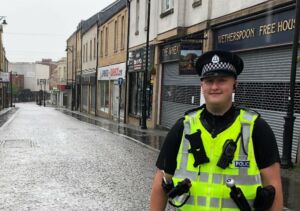With our new website live, we continue our series featuring articles that focus on a ‘day in the life’ of people working in a variety of services and organisations across Ayrshire, whose dedication and efforts are key to reducing reoffending and improving outcomes for people caught up in the Justice system, their families, victims, and the community as a whole.
We would like to thank PC Craig Marshall, Police Scotland, Ayrshire Division for sharing his story with us.

Craig’s role involves working with people in our communities who have a high instance of reoffending. His duties are to work alongside Peer Workers to understand what makes a person offend and to try and resolve some of the underlying issues all in an effort to divert them from the justice system whilst impacting on them personally. Building trust and relationships is important in Craig’s role and this allows him to connect people into other services. A big part of Craig’s role is meeting people where they are at the grass roots of their issues and working with them to make their life and the community around them better.
Craig has worked in policing since he left secondary school. Undertaking his training at The Scottish Police College, Tulliallan. Craig was a Police Cadet and then became a Police Constable aged 18 when he was posted to Kilmarnock. Craig always wanted to be a police officer and has worked in various roles across Ayrshire.
“There have been several rewarding moments since starting in policing”
A typical day
I was asked what a typical day looked like in my current role, and I found this a difficult question to answer, as I have no control over what my day will look like. I often have my day planned out of what I would like to achieve but this can change at the drop of a hat depending on what scenarios I am faced with. I can be offering very low-level advice to dealing with a life-threatening overdose and everything in between.
I predominantly work 8.30am to 5.30pm during the week but work every second Saturday and at any events Police Scotland need me to police. A lot of my police day is spent talking to people but also doing paperwork, updating details on police systems, and carrying out checks.
Being co-located has its benefits as there is support for those people, I am dealing with that would not be directly accessed from a police building but IT has its challenges as I need to go back to the police station if I am doing sensitive work.
The moment I’ll always remember
There have been several rewarding moments since starting in policing but the most recent was having worked with someone for a few months, when we started out, they ‘hated the police’ and would not sit in the same room as me based on my occupation. After months of building trust, forming a relationship and being able to offer to help them with their situation, I received a thank-you card. The card was written to me, and the wording was about the person having judged me without knowing me and being eternally grateful for what I had done for them. The bit that will last with me was about how I had treated them and how that had changed their overall opinion of ‘The Police.’
“As police officers we become very good at dealing with crisis but in my current role I really enjoy helping people before it becomes a crisis”
One thing I wish I had known when I started out
When I started out in policing I had very little knowledge of the effects of trauma and the knock on this had into addictions. I wish I had known more about this as it would have helped better understand why people turn to substances.
We have in recent years done more training in relation to trauma, but I do not think this gave me anymore insight or knowledge than I had gained as an individual and police officer over the years.
What I love about my job
I love being able to help others. As police officers we become very good at dealing with crisis but in my current role I really enjoy helping people before it becomes a crisis.
Police Scotland provide lots of opportunities for us to learn new skills, take part in various types of training and develop personally and professionally.
If I could change anything
If I could change anything it would be to make people have better tolerance of each other and be more aware of people’s individual circumstances. I would love if services linked together better focusing on the person’s future as opposed to dealing with the ‘there and then.’
By working with people from an early age, who are deemed at risk of offending, we may be able to help them to choose a more fulfilling path for their life.
“I have spent half of my life serving the communities of Ayrshire and look forward to doing this for years to come”
The not so nice parts of my job
As a police officer we deal with a whole host of incidents which are not so nice. I always find dealing with bereaved families the hardest, especially when you have worked with that family and have a personal connection to the circumstances.
Where I see myself in five years
I always find this question the hardest to answer. I have always chosen to do jobs I find challenging but rewarding. Who knows what the future will bring, I have spent half of my life serving the communities of Ayrshire and look forward to doing this for years to come.
Would I choose this path again if I could?
I would absolutely choose to take this path again and would encourage anyone that enjoys putting the needs of others at the top of their priority list to come and try it too.


